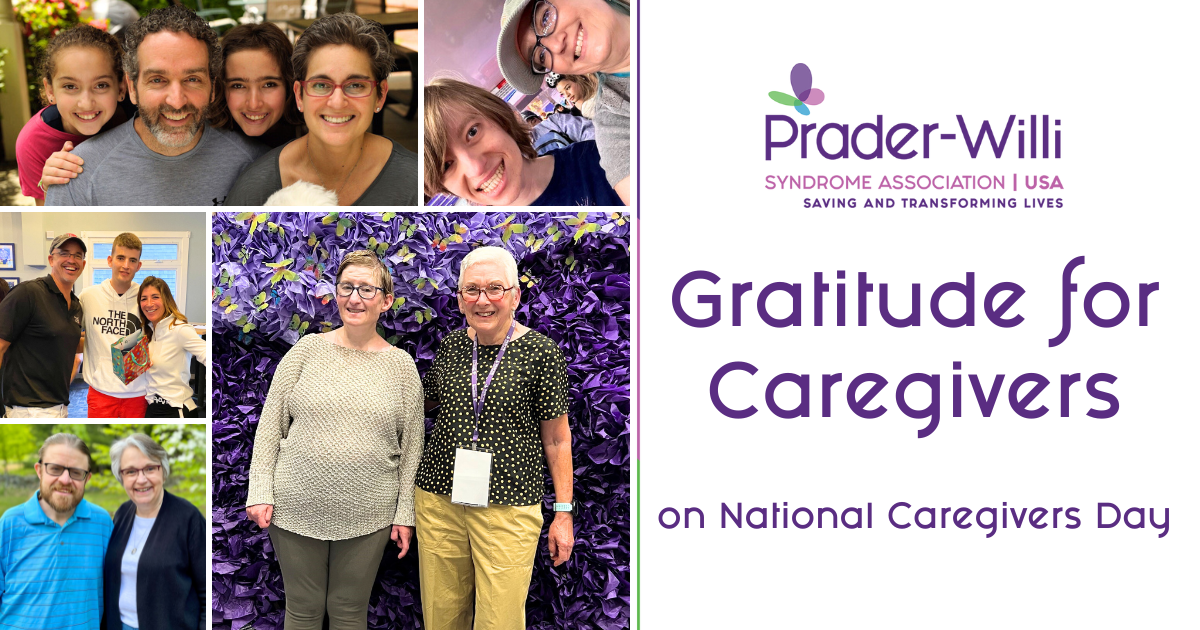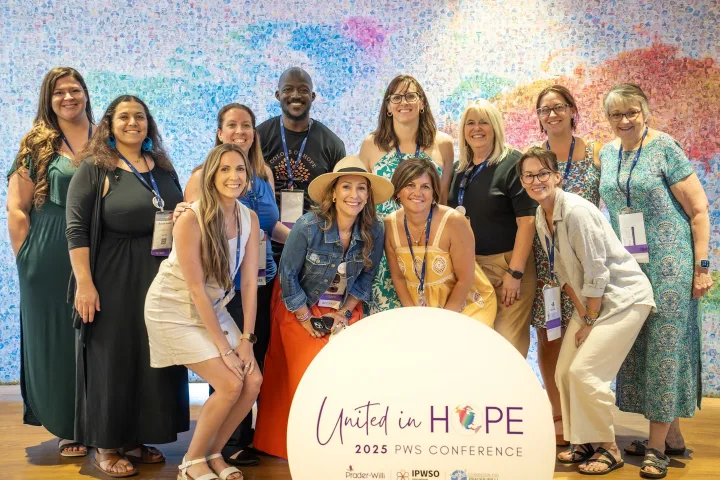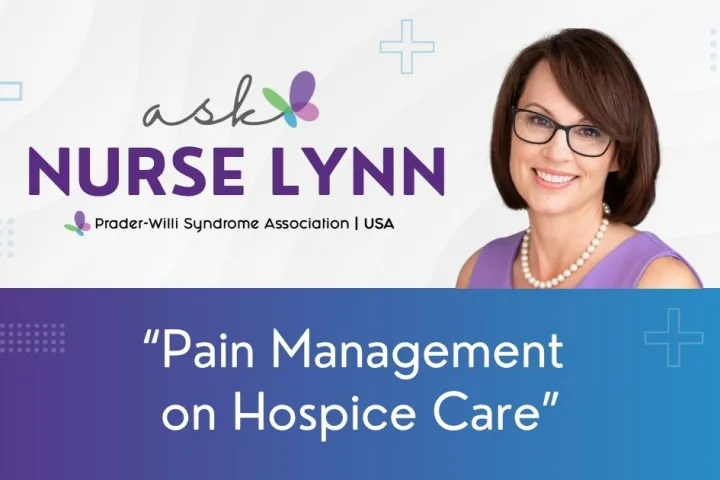National Caregivers Day, the third Friday in February (February 16th), was founded in 2015 by the Providers Association for Home Health and Hospice Agencies. This is a day to recognize caregivers of all types, family, professional, independent, private duty, and informal.
We want to first express our gratitude, appreciation, and support for all caregivers. From parents to paid professionals, we know caregiving is a challenging role that brings with it a myriad of emotions, from frustration to fun, heart break and joy. We honor all of our PWS caregivers.
We would also like to take this opportunity to sharpen our focus a bit and recognize two distinct types of caregivers: the many caregivers working in residential homes and the parents of adults with PWS, whether living at home or in a residential facility.
Parents and Caregivers of Adults:
Despite the demands and challenges that come with raising a child with a genetic disorder like PWS, parents expect to be caring for children for their first few decades. What most people don’t expect is to be caring for those children well into their adulthood and beyond. Parents of adults with PWS are in unexpected territory. Empty nest woes are replaced with fears of who will care for their loved one. How will their adult fit into society without the structure and safety net of the school system? It is at times a reversion back to the demands of raising small children. When our loved ones are in school, we have time to be ourselves and know they are well supervised. Caregivers of adults may no longer have that luxury.
If you are the parent of an adult, we encourage you to find ways to take care of yourself as well. What can you bring into your life that helps you find joy? A moment of peace? Satisfaction? Encouragement that your loved one is and will be taken care of even when you are not there? How can you find something for yourself?
We asked some adults in our PWS community what is something they do to take care of themselves and here is what they had to say:
Elaine Towle:
I had always said when I retired, I wanted to take piano lessons. It took me a couple of years, but I am doing it! It is definitely “me” time – that’s not so important physically now that my son is a grown man, but it is important mentally. When I am concentrating on the piano, there is no room for anything else – it is a wonderful time to just focus on the piano and what my hands are doing.
Tammie Penta:
One thing that I do for myself that took me too long to do is go out with my girlfriends. Sometimes it is just a night out, but I make a point to go out of town at least once a year without any family to decompress, laugh and forget about PWS. Side note, I wish my older self would have told my younger self to do this many years ago. It truly renews the soul.
Laurie Sagar:
1. A daily spiritual practice, mine consists of a daily reading, F. Richard Rohr’s daily contemplation email, a friend that texts me a daily prayer, followed by a private daily email to God which I save in my drafts.
2. Workouts with a trainer, yoga, and dancing flamenco.
3. Painting and other arts.
4. Time outside in nature.
5. Planning, shopping, and preparing healthy meals.
I need multiple outlets and I need them all, no one is my favorite!
Residential Homes:
Many families in the PWS community would be facing far greater challenges if not for residential facilities that provide a safe home and support for our loved ones with PWS. Great residential facilities offer our loved ones community engagement, meaningful employment, food security and behavior support, along with providing staff ongoing PWS specific training. Families can feel a sense of peace when their loved one is in a safe environment, active and engaged. Families can focus their time together on enjoying their connection without the constant struggles that may come with adult children living in the home.
PWSA | USA works with a lot of residential homes, and we are grateful for the dedication and support they offer families with PWS. There are far too many to name, but we’d like to recognize a few as examples of the dedication and success possible and of our sincerest gratitude and appreciation.
Several facilities have recently taken the time for PWS specific training, showing some of the great effort they are making to improve care for those with PWS.
Ohio Valley Residential Services (OH) and Hamilton County DD are new to PWS but have opened a home to serve 2, soon to be 3. They offer great community engagement, behavior support, and finding employment opportunities or activities that interest each individual.
AME Community Services of Minnesota continues to provide person-centered services to adults with PWS. They are working to develop a crisis home and other new programs like apartment living and increasing the use of technology to help individuals reach their goals of independence.
DD Homes Network in IL has a great day program, individualized care, and a willingness to work to meet behavior and medical needs.
Bridges Support Services in ME is making great efforts and having success with keeping individuals involved in their community.
ARC of Alachua County FL recently opened new homes and continues to expand while also working with some high behaviors.
WI has Abilities Midwest, PWH, and Patheon Industries. They provide a work site for those at PWH that want to work, along with great food security and inclusion as they serve other populations in the same environment.
Latham Centers of Massachusetts is not only a wonderful residential and educational facility for individuals with PWS, but they also create opportunities for engagement in the broader PWS community, along with caregiver support and education.
Our gratitude extends further and beyond:
Cardinal of Minnesota
Camelot Society, Washington
Invisions in Pennsylvania
Laura Baker Services, Minnesota
Progressive Homes Inc., Illinois
Stepping Out, Minnesota
Be sure to check out our Residential Directory to find facilities across the country.
How to Say Thank You
If you have a loved one living in a residential facility and would like to show your appreciation to the caregivers, here are some suggestions.
- Send flowers to the facility.
- Write a thank you card expressing your personal gratitude.
- Tell the supervisor how much you appreciate the work they do.
- Bring in a gift card to their favorite restaurant or a local masseuse.
- Take a moment to ask about their lives.
- Find out their birthday and send them a gift.
- Share with the caregiver the ways they have positively affected your loved one’s life.
Gratitude
Gratitude is a simple act that has the power to transform relationships, shift the mood of a day or the feelings about a job. When people know they are appreciated, work is easier, and connections are healthier and more genuine. Caregivers of all types are often over-worked and under-appreciated. Please remember to show the caregivers in your life (including you) the gratitude they deserve. Know that we at PWSA | USA are truly grateful for all that you bring to this community and the lives of our loved ones with PWS.
Share this!





 Jennifer Bolander has been serving as a Special Education Specialist for PWSA (USA) since October of 2015. She is a graduate of John Carroll University and lives in Ohio with her husband Brad and daughters Kate (17), and Sophia (13) who was born with PWS.
Jennifer Bolander has been serving as a Special Education Specialist for PWSA (USA) since October of 2015. She is a graduate of John Carroll University and lives in Ohio with her husband Brad and daughters Kate (17), and Sophia (13) who was born with PWS. Perry A. Zirkel has written more than 1,500 publications on various aspects of school law, with an emphasis on legal issues in special education. He writes a regular column for NAESP’s Principal magazine and NASP’s Communiqué newsletter, and he did so previously for Phi Delta Kappan and Teaching Exceptional Children.
Perry A. Zirkel has written more than 1,500 publications on various aspects of school law, with an emphasis on legal issues in special education. He writes a regular column for NAESP’s Principal magazine and NASP’s Communiqué newsletter, and he did so previously for Phi Delta Kappan and Teaching Exceptional Children. Evan has worked with the Prader-Willi Syndrome Association (USA) since 2007 primarily as a Crisis Intervention and Family Support Counselor. Evans works with parents and schools to foster strong collaborative relationships and appropriate educational environments for students with PWS.
Evan has worked with the Prader-Willi Syndrome Association (USA) since 2007 primarily as a Crisis Intervention and Family Support Counselor. Evans works with parents and schools to foster strong collaborative relationships and appropriate educational environments for students with PWS. Dr. Amy McTighe is the PWS Program Manager and Inpatient Teacher at the Center for Prader-Willi Syndrome at the Children’s Institute of Pittsburgh. She graduated from Duquesne University receiving her Bachelor’s and Master’s degree in Education with a focus on elementary education, special education, and language arts.
Dr. Amy McTighe is the PWS Program Manager and Inpatient Teacher at the Center for Prader-Willi Syndrome at the Children’s Institute of Pittsburgh. She graduated from Duquesne University receiving her Bachelor’s and Master’s degree in Education with a focus on elementary education, special education, and language arts. Staci Zimmerman works for Prader-Willi Syndrome Association of Colorado as an Individualized Education Program (IEP) consultant. Staci collaborates with the PWS multi-disciplinary clinic at the Children’s Hospital in Denver supporting families and school districts around the United States with their child’s Individual Educational Plan.
Staci Zimmerman works for Prader-Willi Syndrome Association of Colorado as an Individualized Education Program (IEP) consultant. Staci collaborates with the PWS multi-disciplinary clinic at the Children’s Hospital in Denver supporting families and school districts around the United States with their child’s Individual Educational Plan. Founded in 2001, SDLC is a non-profit legal services organization dedicated to protecting and advancing the legal rights of people with disabilities throughout the South. It partners with the Southern Poverty Law Center, Protection and Advocacy (P&A) programs, Legal Services Corporations (LSC) and disability organizations on major, systemic disability rights issues involving the Individuals with Disabilities Education Act (IDEA), Americans with Disabilities Act (ADA), and the federal Medicaid Act. Recently in November 2014, Jim retired.
Founded in 2001, SDLC is a non-profit legal services organization dedicated to protecting and advancing the legal rights of people with disabilities throughout the South. It partners with the Southern Poverty Law Center, Protection and Advocacy (P&A) programs, Legal Services Corporations (LSC) and disability organizations on major, systemic disability rights issues involving the Individuals with Disabilities Education Act (IDEA), Americans with Disabilities Act (ADA), and the federal Medicaid Act. Recently in November 2014, Jim retired.